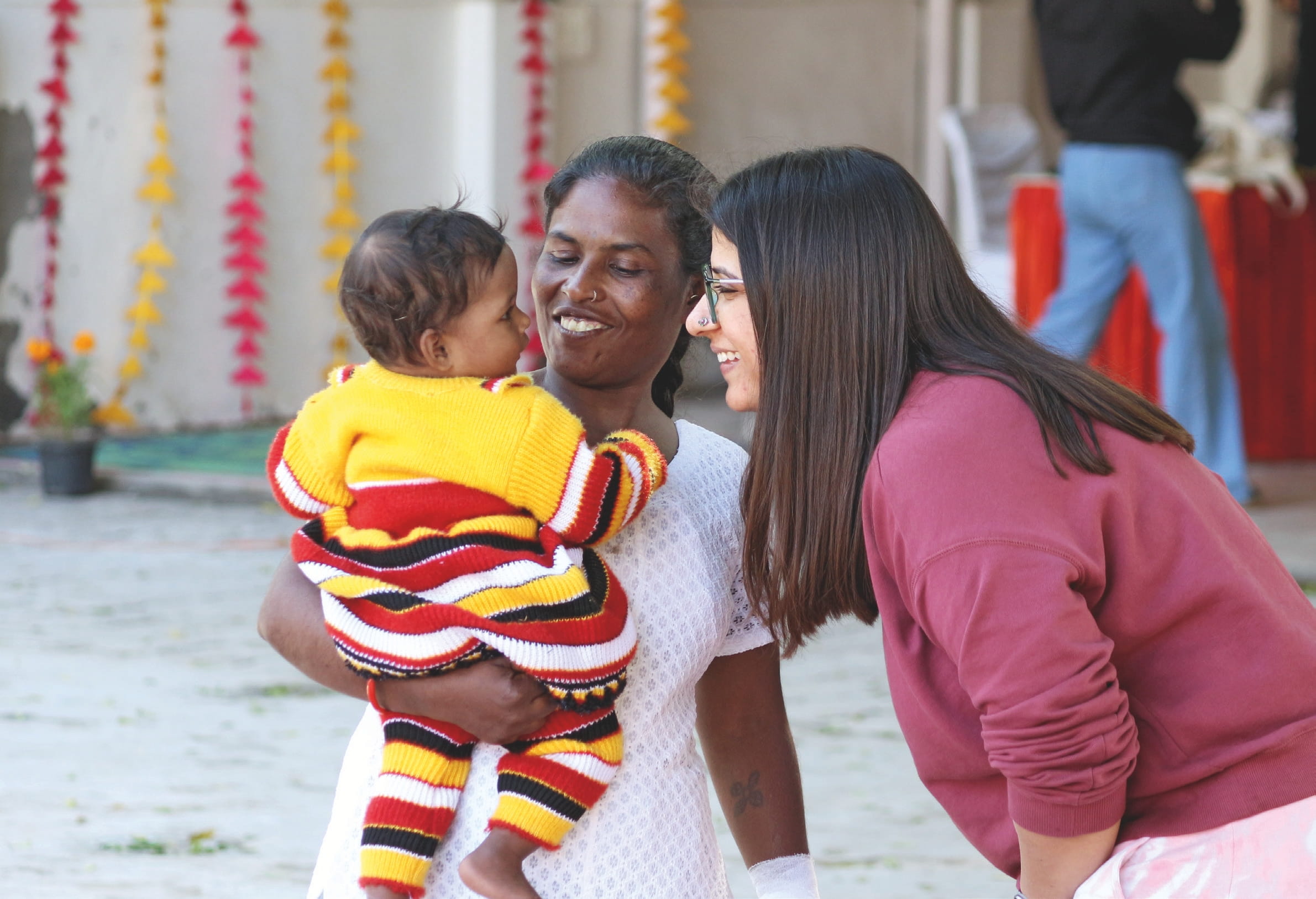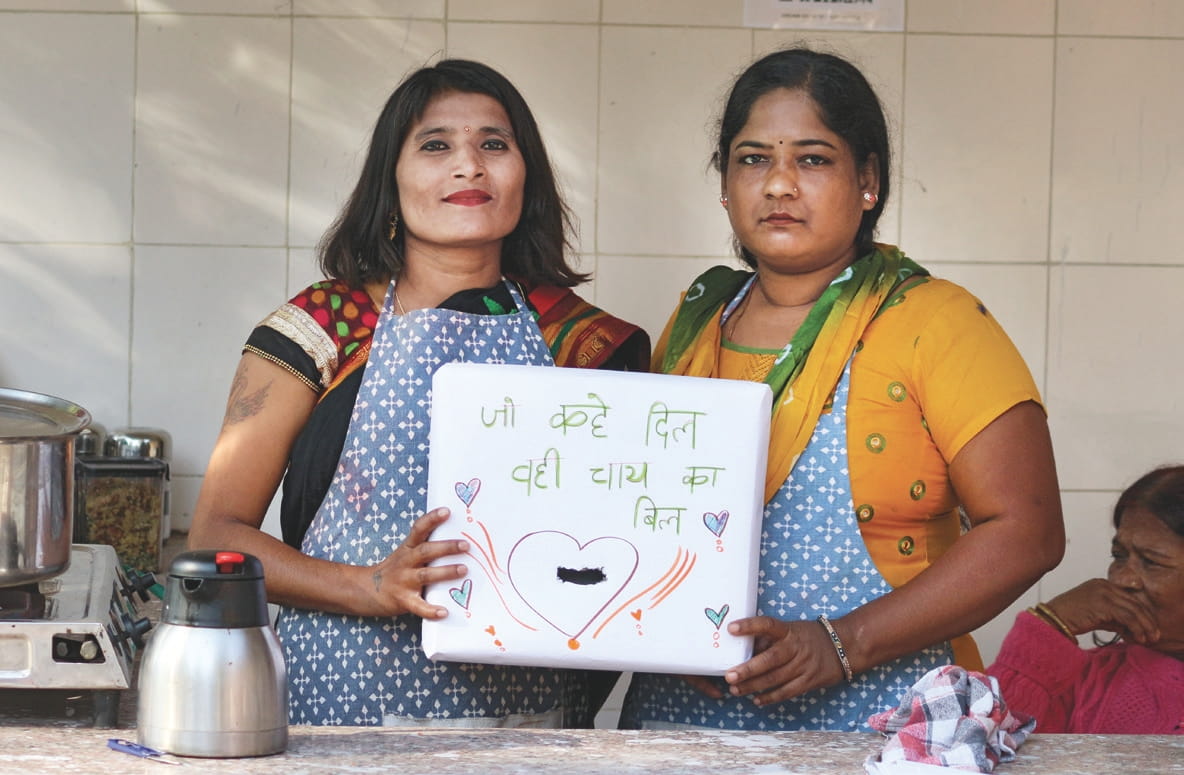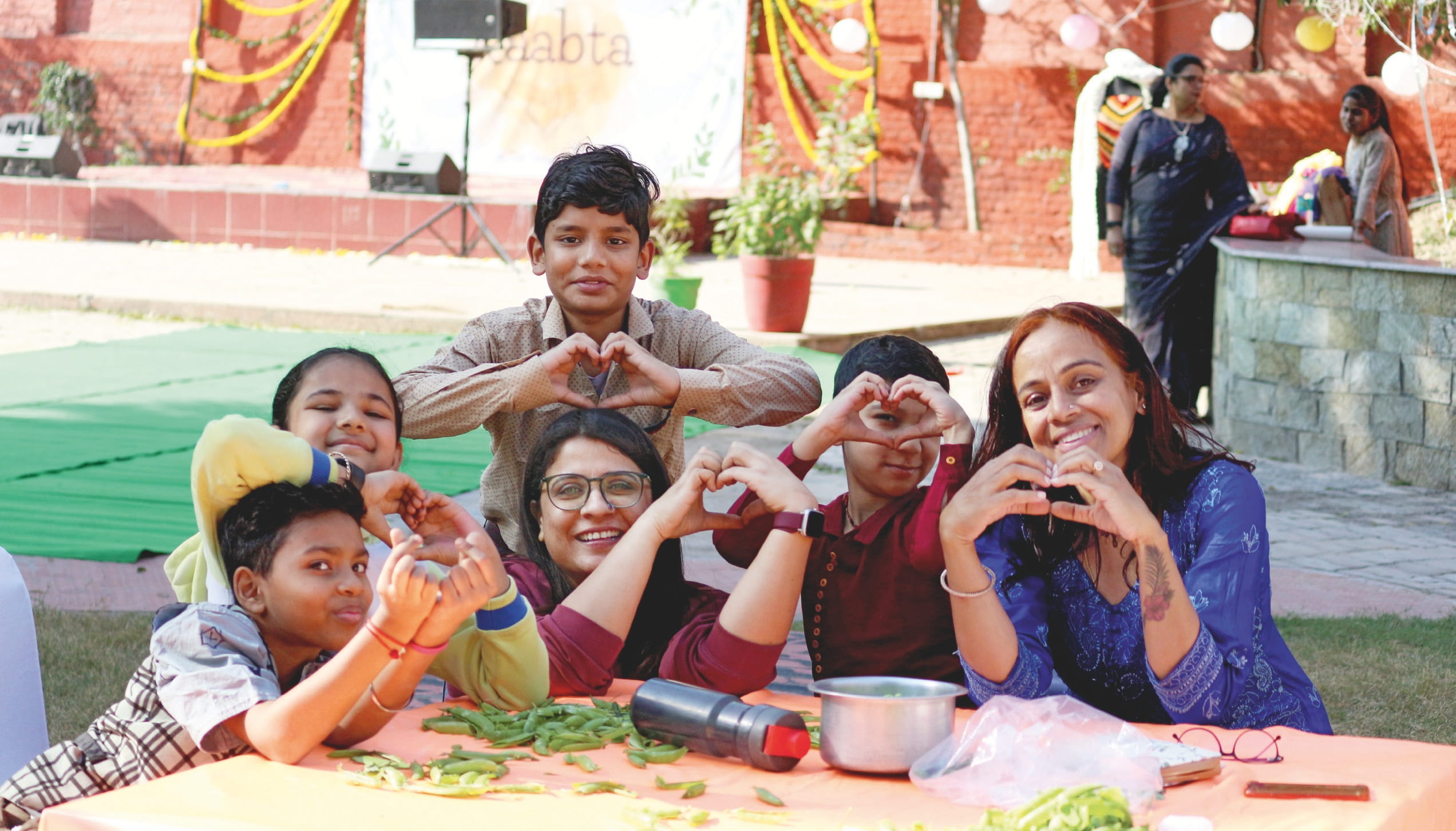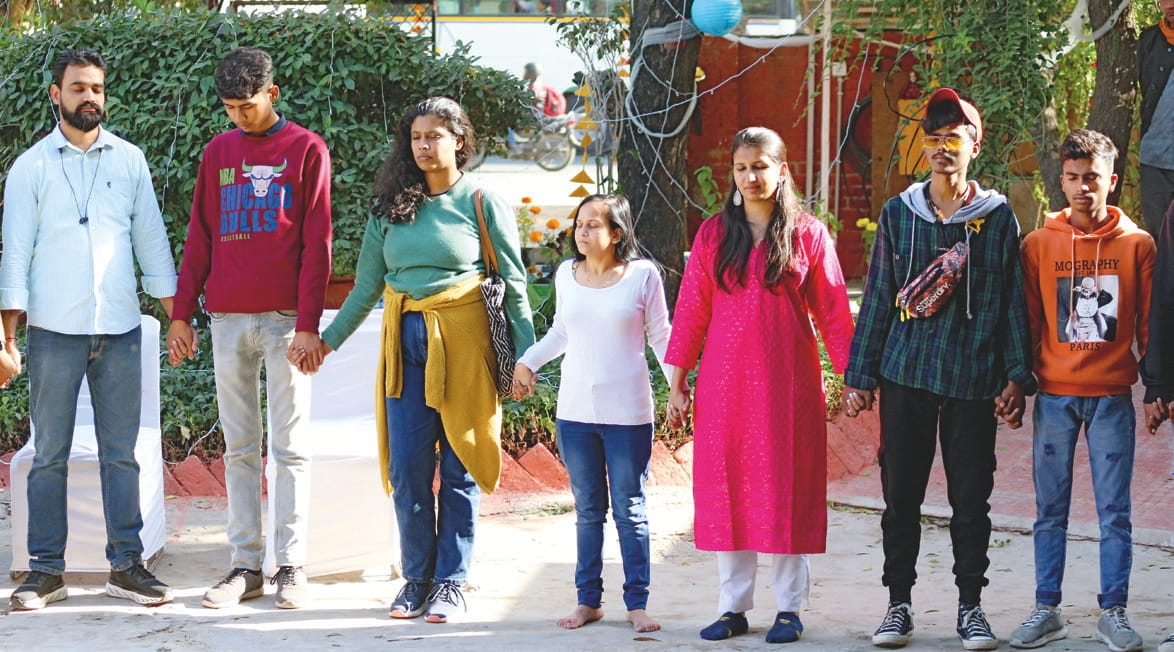Stories > Mending Broken Dreams
Mending Broken Dreams
Gitanjali Babbar founded the New Delhi-based non-profit Kat-Katha to give a voice to trafficked sex workers while empowering them to live with dignity.
BY SANDHYA MAHADEVAN

Gitanjali Babbar founded non-profit Kat-Katha in New Delhi in 2013 to help women trapped in the sex trade find alternate means of living by offering them a residential facility – Dream Village – as well as upskilling classes.
ailing from a poor rural family, Swati* got a new lease of life at The Dream Village, located in Noida, a satellite town of India’s capital, New Delhi. Established by non-governmental organisation (NGO) Kat-Katha in 2021, the 32-year-old became the first resident of the farmhouse that offers a refuge to sex workers.
She was barely 14 years old when a seemingly benevolent stranger — a woman — sold her the idea of a dream job that would pay her more than tenfold of what she was earning as a factory worker. Going against her family’s prohibition, she took up the offer as it would enable her to live a better life and afford medical treatment for her ailing father. Her dreams were rudely shattered when she realised that she had in fact been sold to a brothel in Delhi’s Garston Bastion Road (GB Road). Threatened with death if she tried to escape, she remained trapped in the sex trade for over 20 years.
Swati’s story is not an isolated one. While it is a global problem, India ranks high on the top-10 list of countries where sex trafficking is a major problem.
According to Legal Services in India — a government-recognised free legal resource — every hour, three out of every four girls who enter into prostitution do so against their will.

Women at The Dream Village learn culinary skills, as well as how to operate cloud kitchens that can be run commercially, to generate a living.
“[The Dream Village] feels like home. No one forces me to do anything, and I get to learn new skills.”
Bimla*, resident, The Dream Village
Bindu*, another resident of The Dream Village, was pushed into the trade 25 years ago with the promise of a high-paying job. Over the years, she ended up bearing two children for one of her clients, and became a single mother. The women are forced to carry the unwanted pregnancies by the brothel owners, who use the kids as leverage against the women.
BEYOND THE STATISTICS
BThis was the reality Gitanjali Babbar, founder of Kat-Katha, encountered during her first visit to GB Road as an employee of NGO National Aids Control Organisation (NACO). Upon visiting it, she made a startling discovery: Over 85 brothels — masquerading as trade shops selling machinery, automobile parts and hardware tools — lined the street.
Shocked by the grim conditions the prostitutes lived in, she wanted to do more, but was urged by her boss to not stray from the main focus of the NGO. The sole purpose of their visit to was to reduce the instances of HIV and AIDS; to ensure the prostitutes were using and had access to condoms and contraceptives; and were on track with their regular testing for HIV and other sexually transmitted infections as well as syphilis.
“It was disheartening to see that in an era of female empowerment, women were being sold and forced to service strangers multiple times a day,” she says.
While she understood that NACO did not want to shake things up and were only focused on the women’s physical wellbeing, Babbar began to feel like a misfit in the NGO. “I wanted to do more,” she says.

The Dream Village was set up in 2022 to house women working in the sex trade and their children escape their tough circumstances, and live with dignity.
TAKING A STAND
She began visiting the brothels to learn first-hand about the women working there. Even the dangers lurking outside the brothels did not bother the brave activist in her 20s as much as the challenge of earning the trust of these women.
It took her over four years to build a relationship with the sex workers in GB Road, during which she spent entire days at the brothels. She shares that she wanted to be the friend whom the women could open up to, and share their dreams and needs with. Key to these interactions was the fact that Babbar neither wielded a morality compass nor posed as a saviour who was there to rescue them.

Babbar (wearing glasses) with the children of sex workers who live at The Dream Village. Along with volunteers, she runs a foundation school for the children to help them transition to formal schools.
“The past year has been a beautiful, learning journey at The Dream Village. To see the women rediscover themselves keeps me going.”
Gitanjali Babbar, founder, Kat-Katha
“Many social workers have come into their lives and broken their trust. They didn’t trust anybody then,” she says. From being an empathetic friend to someone who could help them with Google searches, she slowly gained their confidence. She was also the first person they called when they had trouble with law enforcement. “They want to see the real you,” she says.
She started off by teaching them English. With the help of volunteers who responded to her Facebook posts detailing her mission, she also conducted drawing and music classes for the children at the brothels. While there was no plan to start an NGO, Babbar’s dedication to help rehabilitate sex workers led her to launch Kat-Katha in 2013, when she realised the need for a legal entity in matters such as approaching the authorities and other NGOs.
HOME AND HEARTH
The women in GB Road address Babbar as their didi or beti (Hindi for sister and daughter, respectively), and the Kat-Katha family replaces their own families who they cannot return to. “I helped to provide medical treatment for my father, but he didn’t want to see me even on his deathbed — he passed away a year ago,” Swati says with a tinge of pain.
The societal taboos permeate all aspects of their lives, says Babbar. Despite the availability of government hospitals in the neighbourhood, even the doctors shun them once they see the address on their identity cards, she adds.
Their children do not get accepted at regular schools, and those who do by sheer luck are mercilessly taunted by their schoolmates and even the teachers. With a lack of schools in GB Road, Babbar started a bridge school for the children, which became their safe learning space to ease their transition into formal schools.
Kat-Katha also opened a skilling centre for tailoring in GB Road in collaboration with Pahal Foundation, an NGO that aims for economic development of the underprivileged. Babbar’s objective was to boost the women’s confidence and introduce them to other means of livelihood.
Finding The Dream Village, a former wedding venue, took many years of searching as nobody wanted to rent a place to sex workers. It now rehabilitates 12 women and their children, and houses a skilling centre on its premises. This includes the tailoring project HeArtshala, which enables the women to sell their merchandise through companies that Kat-Katha has partnered with. There is also Maitri Meals, a government-registered cloud kitchen that teaches the women culinary skills as well as equipping them with the knowhow to run an independent kitchen.
Today, Kat-Katha has won several corporate and government awards for its work. While Babbar is grateful for the recognition, she wants to do more — from providing a refuge for sex workers around India to championing the rights of these workers and their children.
She adds that although she is appreciative of the support she receives from the local police, in a country where trafficking and public solicitation for prostitution are illegal, the brothels in GB Road fall under a grey area that often raises jurisdiction issues. However, awareness on these issues is on the rise, she says.

A video feature on The Dream Village by the Singapore International Foundation’s digital storytelling unit Our Better World (OBW) garnered about 1.75 million online views and drew many inquiries. “My experience with OBW has been one of the best in my 10 years of experience of working with the media [see sidebar],” she says. “Many people wrote to us to learn about our work.”
Babbar says that she was delighted when the story won in the Best Use of Storytelling segment in the Shorty Awards, which honours the most compelling and shareable social good campaigns, projects and initiatives using effective storytelling to reach a certain goal or objectives.
For the current residents, The Dream Village is akin to heaven on earth. “It feels like home. No one forces me to do anything, and I get to learn new skills,” says another resident, Bimla*.
That is all the affirmation Babbar wants. “Even after a decade of doing this work, my success stories are not even in the hundreds,” she says, adding that it is more challenging with women getting lured into the trade through online avenues. “The past year has been a beautiful, learning journey at The Dream Village. To see the women rediscover themselves keeps me going.”
* Names have been changed.
THE ART OF STORYTELLING
Our Better World was established in 2012 to harness the power of digital networks for positive change. It tells compelling stories of people doing good around Asia to inspire online audiences who care about social causes to act. Here are some of its achievements over the last decade.
9
causes represented
11
countries covered
352
stories told
422
people featured
778,000
-strong online
community built
1.3 MILLION
actions inspired, in the form of online sharing, volunteering and donating
22.9 MILLION
online views achieved

Scan the QR code
to find out more.
